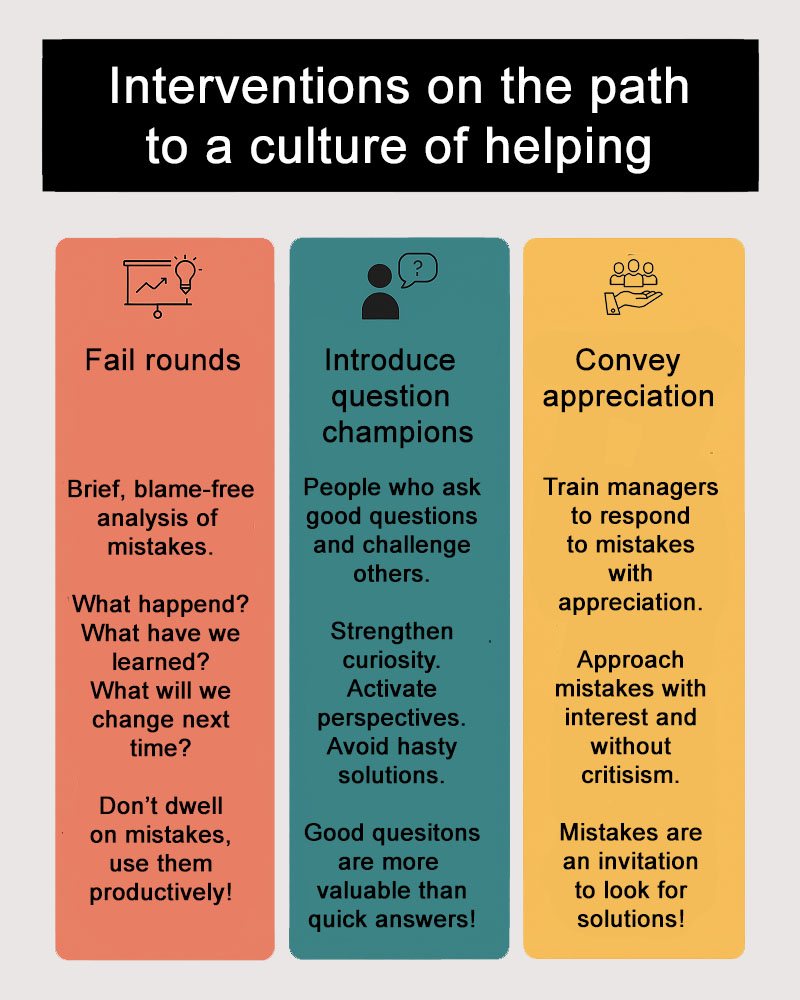From a culture of error to a culture of support
For years, many organisations have been calling for a stronger culture of error. However, the call for a culture of error often remains abstract. It describes a desired outcome, but not the path to get there. And this is precisely where the crucial difference lies between this approach and one that is significantly more effective in everyday life: a culture that does not focus on the error, but rather on mutual support in dealing with it. A culture of support creates the conditions in which learning, development and cooperation can actually flourish.
As an expert in team and workplace climate assessment, I regularly observe how organisations work hard on their error culture, yet still miss the point. Often, the focus is on abstract mission statements, while the actual climate experienced in everyday life is hardly taken into account. The crucial difference lies in the order. The starting point is not the idea of a changed culture, but the concrete, measurable optimisation of the atmosphere. From this tangible foundation, a culture of error and support develops that truly strengthens teams.
The measurable benefits of a culture of support
Before discussing measures, it is worth looking at the impact. A culture of support is not a soft feel-good concept, but a clearly measurable performance factor. The difference between teams with a culture of support and those with a traditional error culture is reflected in concrete, reliable key figures that illustrate the economic benefits.
- Knowledge transfer and learning speed: When mistakes are understood as learning opportunities, the speed of knowledge transfer demonstrably increases. Studies show that psychological safety increases team performance by up to 12 per cent. Those who do not fear sanctions share knowledge earlier and more completely. [1]
- Innovative strength: Organisations with a strong error culture produce more market-ready innovations. Innovation comes from experimentation, and experimentation inevitably leads to errors. Only those who understand errors as aids in the innovation process create the necessary space for them.
- Problem-solving speed: When errors are addressed openly, the average problem-solving time decreases by 30 to 50 per cent. Problems are identified earlier, before they escalate, and collegial support activates the collective intelligence of the team.
- Employee retention: Teams with high psychological safety have significantly lower turnover. People stay where they are allowed to develop, and development always means being allowed to make mistakes. [2]
These results show that a culture of support is not based on good intentions, but on a noticeable difference in everyday working life. And it is precisely this difference that is created not by abstract cultural programmes, but by the way teams interact with each other on a daily basis.
Why climate is the key to culture
Many transformation processes fail due to a simple mistake. Organisations start with abstract cultural change programmes, even though concrete climate interventions would be necessary first. Culture describes deeply rooted, often unconscious basic assumptions. It is difficult to grasp and only changes in the long term. Climate, on the other hand, manifests itself in perceptible behaviours and interaction patterns. It is directly measurable and can be influenced immediately. [3]
In practical terms, this means that before mission statements are developed or values are defined, a precise assessment of the current situation is required. How does a team actually interact with each other? Workplace climate analyses provide clear indications of this, for example through questions such as:
- How openly are mistakes communicated?
- How do managers respond to problem reports?
- How often do employees ask for help?
- How often is collegial support practised?
Such measurements create the basis for concrete, everyday interventions. Instead of talking about desired values, teams introduce visible behavioural changes. These include the 5-minute rule for a brief error analysis without assigning blame, regular learning sessions on current challenges, or the systematic documentation of lessons learned. When the climate improves noticeably, the culture automatically changes with it. New behaviours become habits, habits develop into norms, and these norms give rise to a cultural self-image that supports a genuine culture of support.
Complexity capability through collegial consultation and cooperation
Modern organisations face challenges that no one can solve alone. They need teams that think, learn and act together. This requires a performance-enhancing team climate and co-creative meaning systems. This refers to environments in which people develop new solutions together instead of repeating familiar patterns. [4]
The connection to the helF culture is obvious. Without collegial help, open communication and genuine cooperation, there is no room for the diversity that complex systems require. Complexity here refers to a team’s ability to respond flexibly and creatively to uncertainty and new situations. The more different perspectives, experiences and approaches come together, the more complex a team becomes.
A helF culture creates precisely these conditions:
- Diversity of perspectives: Those who can express their ignorance without fear of embarrassment invite other perspectives. ‘I don’t know’ becomes ‘Who has a different point of view?’
- Space for experimentation: Understanding mistakes as helpful means legitimising experimentation. Only through experimentation can teams open up new possibilities that they need for complexity-capable solutions.
- Emergent intelligence: Psychologically safe environments give rise to collective intelligence that is more than the sum of individual contributions. Ideas are developed rather than rejected, and doubts become productive rather than inhibiting.
- Co-creative meaning systems: These arise where people create meaning together, learn from each other and combine their perspectives. A culture of support acts as a catalyst in this process. It transforms potential obstacles into bridges, uncertainty into curiosity, and mistakes into opportunities for development.
When teams become more capable of dealing with complexity through a culture of support, the crucial question arises as to how this climate can be created in practice. This is precisely where concrete implementation begins.
Practical implementation: From measurement to action
The good news is that a culture of support can be developed systematically. The first step is to measure the climate precisely in order to identify the actual starting point. Use validated instruments that measure participatory safety, willingness to cooperate and learning orientation. It is crucial that this measurement is not seen as a control measure, but as a common framework for development.
Based on this, concrete interventions follow:
- Establish formats such as weekly fail rounds, in which teams share their learning moments and highlight what has helped them.
- Introduce question champions who emphasise that good questions are more valuable than hasty answers.
- Train managers to respond to error detection with appreciation. Not with criticism, but with genuine interest and an invitation to search for solutions together.
After three to six months, measure again. The changes will be measurable. They will be reflected in key figures such as problem-solving time, knowledge exchange or staff turnover, but also in the subjective experience of those involved. Teams will report more supportive behaviour, more open communication and a climate in which development becomes a matter of course.
Figure: Interventions on the path to a culture of support
Conclusion: Noticeable changes through a culture of support
Moving from mistakes to helpers is more than just a linguistic game. It describes a measurable development with direct benefits for performance, collaboration and innovation. While abstract cultural programmes often fizzle out in everyday life, concrete climate interventions bring about noticeable changes. The sequence is crucial. First measure, then change, then consolidate. Visible behavioural changes gradually give rise to a culture that is not constructed but experienced.
A helper culture is much more than just a friendly approach to dealing with mistakes. It is a prerequisite for overcoming complex challenges. Teams that treat collegial help as the norm utilise different perspectives, experiment courageously, solve problems earlier and develop a collective intelligence that goes far beyond individual contributions. Mistakes become impulses for development, and helpers become co-creative systems of meaning that modern organisations need in order to actively shape the future.
Notes (partly in German):
Would you like to discuss Sascha Rülicke’s experience with him? Then connect with him on LinkedIn.
[1] Gallup Workplace: How to Create a Culture of Psychological Safety
[2] Boston Consulting Group: Leaders Who Prioritize Psychological Safety Can Reduce Attrition Risk to Less than 3% of Workers
[3] Sascha Ruelicke: Climate of innovation in teams
[4] Kollektive Beratung in sechs Phasen
Would you like to discuss the culture of mistakes and help as a multiplier or opinion leader? Then share this post in your networks.
Sascha Ruelicke has published more articles on the t2informatik Blog, including:

Sascha Ruelicke
Sascha Ruelicke is Managing Director of sbc soptim business consult GmbH. Before joining sbc as a consultant in 2009, where he dealt with topics such as work and process design, innovation, innovation climate, project management and team and organisational development, he worked for almost seven years as a research assistant at the A.U.G.E. Institute of the Niederrhein University of Applied Sciences in applied research. In various research projects there, he got to know team and organisational development in small and medium-sized enterprises.
In the t2informatik Blog, we publish articles for people in organisations. For these people, we develop and modernise software. Pragmatic. ✔️ Personal. ✔️ Professional. ✔️ Click here to find out more.



